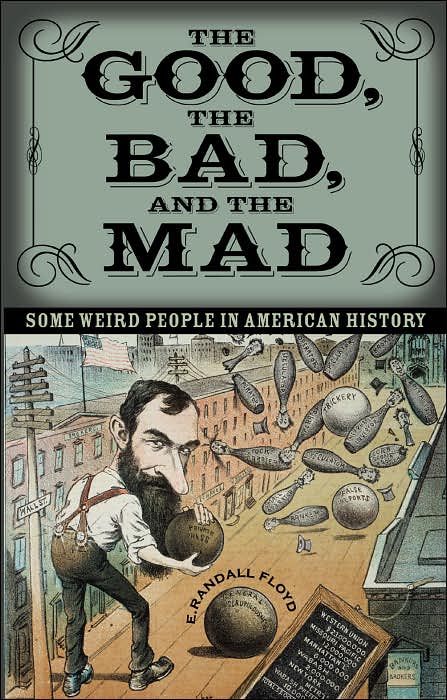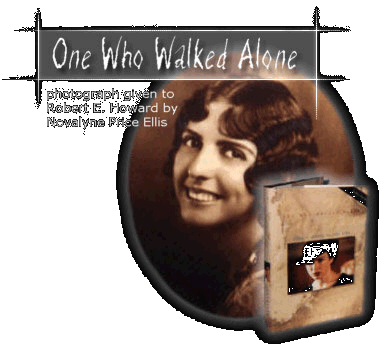Yet Another Drive-By Pathography
Tuesday, February 3, 2009
posted by Steve Tompkins
 Print This Post
Print This Post

(Steve Trout should require next-to-no introduction at this site: a REHupan since the palaeozoic period, contributor to Don Herron’s The Barbaric Triumph: A Critical Anthology on the Writings of Robert E. Howard, and the researcher who stood athwart the expurgationist history of the Donald M. Grant Solomon Kane editions and cried “Stop!” Here he shows us why, to take liberties with the title of a Thomas Ligotti novella, Our Work Is Not Yet Done)
The Good, the Bad, and the Mad (*Disclaimer — [redacted], if you read this your head will probably explode*)
by Steve Trout
Recently my brother sent me the book of this title by one E. Randall Floyd of Augusta State University — who happens to be, unbeknownst to me, a syndicated newspaper columnist as well — which is a collection of short biographies of American characters subtitled “Some Weird People in American History”. The accounts of Ambrose Bierce, Madame Blavatsky, Colonel John Chivington, George A. Custer, Marie Laveau, H.P. Lovecraft, Bernard McFadden, Cotton Mather, William Walker, Sarah Winchester, and others, should be of some interest to my readers for various obscure cultural ties to Howard, but of prime interest, of course, is that Floyd devotes a section to Robert E. Howard as well: “The Tortured Genius Who Walked Alone”. Guess which one Howard is — Good, Bad, or Mad?

Of course, the first paragraph mentions his suicide — but in a slightly jarring foreshadowing, it says it occurred outside his mother’s house. Next we learn that he had been a rising young star in competition with HPL, Henry Kuttner and Robert Bloch — never mind that the first predated him by almost two years and the other two were Johnny-come-latelies in comparison. And “Magazine editors had started calling him for a change.” Even up until the Sixties long distance calls were expensive and rare, so I really don’t think so, at least, I’ve seen no evidence to believe this odd claim.
In due course we learn that Howard suffered from a “mother complex”, isolation, minimal worldly experiences and travel, all the usual drivel. But after this it takes an extreme turn into left field. “After the death of his father, a prominent pioneer physician, Howard became excessively attached to his mother, who encouraged his slavish devotion. As a boy, he determined not to outlive her.” Where this goofball got the idea that Robert and Hester outlived Isaac instead of the other way around is simply beyond me. What is it about newspaper people that keeps them from doing any kind of fact-checking? Needless to say, after an error of this magnitude I can’t take any of the rest of the book on faith, which makes it pretty damn useless.
The Hyborian Age is described, starkly enough, as a time when “chesty heroes clutching swords and big-bosomed damsels lived according to their personal codes” and its most famous character — the “brutish, slow-thinking hero, Conan” – “spent most of his time ‘afire with the urge to kill, to drive his knife deep into flesh and bone, and twist the blade in blood (sic) entrails.” Where are the murdered women, children, and old bootmakers, one wonders.
Another weird claim is that it was in the forties that Conan earned “literary respectability”. True, Skull-Face and Others premiered in that decade, with a number of Conan tales reprinted, but it was a small press book with a limited print run, and critically panned. The entry closes with the claim that “While most biographers and critics have viewed Howard as a crazed, borderline psychopath, a book by former girlfriend Novalyne Price-Ellis, One Who Walked Alone, portrayed him as a deeply sensitive and loving man.”

I’ll give props to the OWWA reference, but I defy you to find a majority, even including de Camp, of biographers and critics who would characterize Howard “as a crazed, borderline psychopath”. It is sad to think that a book from 2005 is so sadly screwed up when it comes to the Robert E. Howard story.
Below: [redacted] promises to keep an open (but non-exploded) mind about The Good, the Bad, and the Mad
